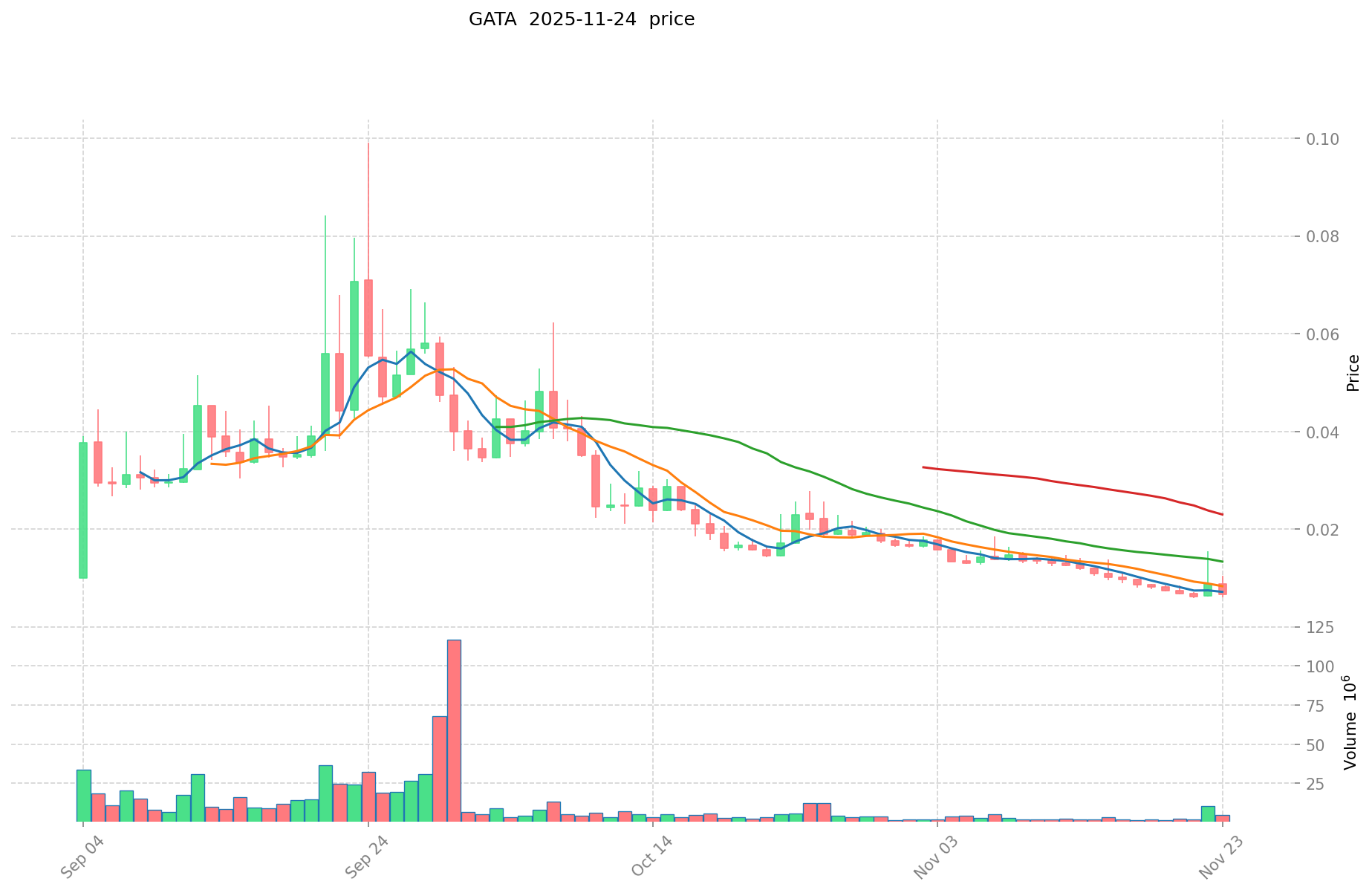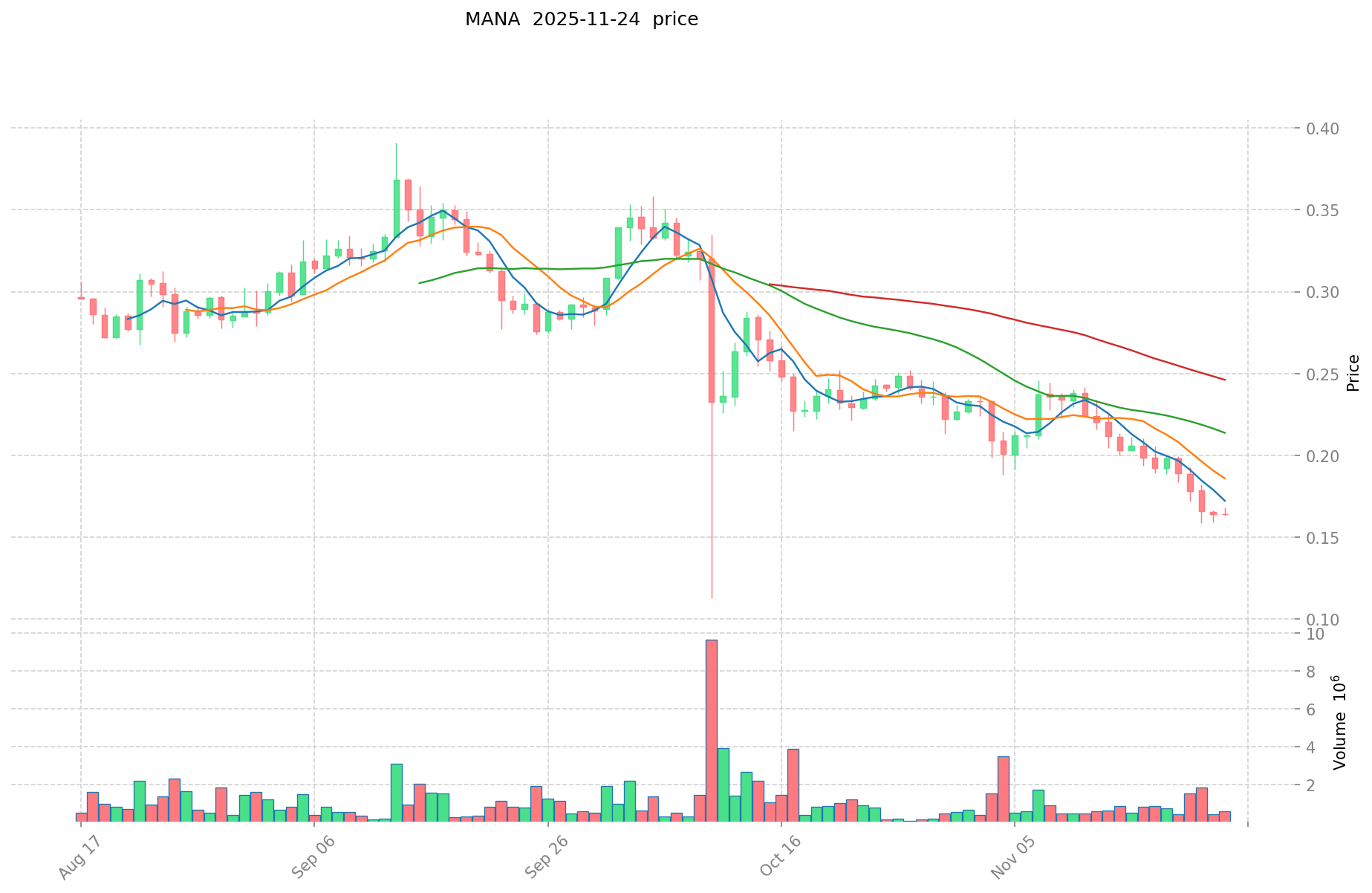GATA vs MANA: The Battle of Virtual Real Estate Tokens in the Metaverse
Introduction: Investment Comparison between GATA and MANA
In the cryptocurrency market, the comparison between GATA vs MANA has always been a topic investors can't ignore. The two not only show significant differences in market cap ranking, application scenarios, and price performance, but also represent different crypto asset positioning.
GATA (GATA): Since its launch, it has gained market recognition for its advanced decentralized AI inference and training technologies.
MANA (MANA): Since its inception in 2017, it has been hailed as a pioneer in blockchain-based virtual worlds, and is one of the cryptocurrencies with high global trading volume and market capitalization.
This article will provide a comprehensive analysis of the investment value comparison between GATA vs MANA, focusing on historical price trends, supply mechanisms, institutional adoption, technological ecosystems, and future predictions, attempting to answer the question investors care most about:
"Which is the better buy right now?"
I. Price History Comparison and Current Market Status
GATA and MANA Historical Price Trends
- 2025: GATA reached an all-time high of $0.09911 on September 24, 2025.
- 2025: MANA experienced significant price decline, dropping 68.89% over the past year.
- Comparative analysis: In the current market cycle, GATA has fallen from its high of $0.09911 to a low of $0.005872, while MANA has declined from $5.85 to $0.1643.
Current Market Situation (2025-11-24)
- GATA current price: $0.007415
- MANA current price: $0.1643
- 24-hour trading volume: GATA $28,183.02 vs MANA $76,205.07
- Market Sentiment Index (Fear & Greed Index): 19 (Extreme Fear)
Click to view real-time prices:
- Check GATA current price Market Price
- Check MANA current price Market Price


II. Core Factors Affecting the Investment Value of GATA vs MANA
Supply Mechanism Comparison (Tokenomics)
- GATA: Its core mechanism aims to diversify wallets across different cryptocurrencies to avoid transaction history homogenization while minimizing address maintenance costs
- MANA: Functions as an investment vehicle where users can profit through buying and selling, similar to stock trading
- 📌 Historical Pattern: Supply mechanisms drive price cycles through consumer acceptance at specific price points, as evidenced by quick sellouts of value-added products
Institutional Adoption and Market Applications
- Institutional Holdings: Brand success is a critical determining factor for institutional interest
- Enterprise Adoption: Professional management systems add important value to investment portfolios
- Regulatory Attitudes: Consumer acceptance is gradually increasing, with government policies potentially affecting adoption rates
Technical Development and Ecosystem Building
- Strategic Integration: As platforms upgrade, they strategically integrate different core elements
- User Experience: Platforms offer diverse options to accommodate various user preferences
- Ecosystem Comparison: Gaming environments enable users to take on investor roles within integrated ecosystems
Macroeconomic Factors and Market Cycles
- Performance During Inflation: Value perception by consumers affects price acceptance
- Monetary Policy Effects: Brand recognition and management quality serve as key determining factors for long-term value
- Geopolitical Factors: Regional differences exist in consumer acceptance, with urban areas showing faster adoption than suburban regions
III. 2025-2030 Price Prediction: GATA vs MANA
Short-term Prediction (2025)
- GATA: Conservative $0.00374595 - $0.007345 | Optimistic $0.007345 - $0.00771225
- MANA: Conservative $0.157728 - $0.1643 | Optimistic $0.1643 - $0.195517
Mid-term Prediction (2027)
- GATA may enter a growth phase, with expected price range of $0.0051970098375 - $0.0099535951125
- MANA may enter a steady growth phase, with expected price range of $0.1721364528 - $0.2076863724
- Key drivers: Institutional capital inflow, ETF, ecosystem development
Long-term Prediction (2030)
- GATA: Base scenario $0.008059324554835 - $0.012028842619157 | Optimistic scenario $0.012028842619157 - $0.015396918552521
- MANA: Base scenario $0.17349099828918 - $0.2551338210135 | Optimistic scenario $0.2551338210135 - $0.267890512064175
Disclaimer: The above predictions are based on historical data and market analysis. Cryptocurrency markets are highly volatile and subject to change. This information should not be considered as financial advice.
GATA:
| 年份 | 预测最高价 | 预测平均价格 | 预测最低价 | 涨跌幅 |
|---|---|---|---|---|
| 2025 | 0.00771225 | 0.007345 | 0.00374595 | 0 |
| 2026 | 0.0100883575 | 0.007528625 | 0.00715219375 | 1 |
| 2027 | 0.0099535951125 | 0.00880849125 | 0.0051970098375 | 18 |
| 2028 | 0.012195356135625 | 0.00938104318125 | 0.008724370158562 | 26 |
| 2029 | 0.013269485579878 | 0.010788199658437 | 0.008522677730165 | 45 |
| 2030 | 0.015396918552521 | 0.012028842619157 | 0.008059324554835 | 62 |
MANA:
| 年份 | 预测最高价 | 预测平均价格 | 预测最低价 | 涨跌幅 |
|---|---|---|---|---|
| 2025 | 0.195517 | 0.1643 | 0.157728 | 0 |
| 2026 | 0.19430118 | 0.1799085 | 0.17271216 | 9 |
| 2027 | 0.2076863724 | 0.18710484 | 0.1721364528 | 13 |
| 2028 | 0.26648406837 | 0.1973956062 | 0.183577913766 | 20 |
| 2029 | 0.278327804742 | 0.231939837285 | 0.17859367470945 | 41 |
| 2030 | 0.267890512064175 | 0.2551338210135 | 0.17349099828918 | 55 |
IV. Investment Strategy Comparison: GATA vs MANA
Long-term vs Short-term Investment Strategies
- GATA: Suitable for investors focused on AI technology potential and ecosystem growth
- MANA: Suitable for investors interested in virtual world applications and metaverse development
Risk Management and Asset Allocation
- Conservative investors: GATA: 30% vs MANA: 70%
- Aggressive investors: GATA: 60% vs MANA: 40%
- Hedging tools: Stablecoin allocation, options, cross-currency portfolios
V. Potential Risk Comparison
Market Risk
- GATA: Higher volatility due to smaller market cap and newer project status
- MANA: Susceptible to shifts in metaverse and virtual world trends
Technical Risk
- GATA: Scalability, network stability
- MANA: Platform adoption, user retention
Regulatory Risk
- Global regulatory policies may impact both differently, with potential focus on AI applications for GATA and virtual asset regulations for MANA
VI. Conclusion: Which Is the Better Buy?
📌 Investment Value Summary:
- GATA advantages: Advanced AI technology integration, potential for rapid growth
- MANA advantages: Established metaverse presence, larger market cap and liquidity
✅ Investment Advice:
- Novice investors: Consider a balanced approach with a larger allocation to MANA for its established market presence
- Experienced investors: Explore a higher allocation to GATA for potential growth, while maintaining MANA for stability
- Institutional investors: Evaluate both for portfolio diversification, with MANA for established presence and GATA for emerging tech exposure
⚠️ Risk Warning: The cryptocurrency market is highly volatile. This article does not constitute investment advice. None
VII. FAQ
Q1: What are the key differences between GATA and MANA? A: GATA focuses on decentralized AI inference and training technologies, while MANA is centered around blockchain-based virtual worlds and metaverse development. GATA is a newer project with a smaller market cap, while MANA has been established since 2017 and has a larger market presence.
Q2: Which cryptocurrency has performed better in recent price history? A: Based on the provided data, GATA has shown better recent performance. While MANA experienced a significant price decline of 68.89% over the past year, GATA reached an all-time high of $0.09911 in September 2025.
Q3: How do the supply mechanisms of GATA and MANA differ? A: GATA's core mechanism aims to diversify wallets across different cryptocurrencies to avoid transaction history homogenization. MANA functions more as an investment vehicle where users can profit through buying and selling, similar to stock trading.
Q4: What are the short-term price predictions for GATA and MANA in 2025? A: For GATA, the conservative estimate is $0.00374595 - $0.007345, and the optimistic estimate is $0.007345 - $0.00771225. For MANA, the conservative estimate is $0.157728 - $0.1643, and the optimistic estimate is $0.1643 - $0.195517.
Q5: How should investors allocate their assets between GATA and MANA? A: For conservative investors, a suggested allocation is 30% GATA and 70% MANA. For aggressive investors, the recommendation is 60% GATA and 40% MANA. However, these are general guidelines and individual investment strategies should be tailored to personal risk tolerance and financial goals.
Q6: What are the main risks associated with investing in GATA and MANA? A: GATA faces higher volatility due to its smaller market cap and newer status, as well as potential scalability and network stability issues. MANA is susceptible to shifts in metaverse and virtual world trends, and faces challenges in platform adoption and user retention. Both are subject to regulatory risks, particularly concerning AI applications and virtual asset regulations.
Q7: Which cryptocurrency might be better for different types of investors? A: Novice investors might consider a larger allocation to MANA for its established market presence. Experienced investors could explore a higher allocation to GATA for potential growth while maintaining MANA for stability. Institutional investors should evaluate both for portfolio diversification, with MANA offering an established presence and GATA providing exposure to emerging technologies.
Share
Content